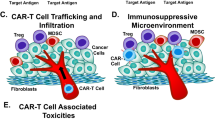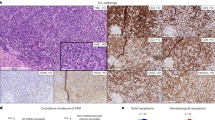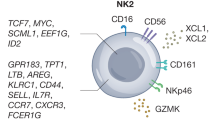Abstract
Dose escalation during consolidation therapy of de novo AML, including myeloablative chemotherapy supported with autologous peripheral blood stem cell transplantation (aPBSCT), continuously improved outcome. Therefore, quality control of transplants is getting increasing interest. We studied leukapheresis products (LPs), consecutively collected during postremission treatment of 20 patients with de novo AML for minimal residual disease (MRD) by 5-parametric flow cytometry and for myelodysplasia (MDS)-associated alterations by paired lineage-selected colony assays for colony-forming units-megakaryocytes (CFU-mega) and burst-granulocytes-monocytes colony-forming units (CFU) to evaluate the predictive value of these transplant-associated parameters on outcome. We defined the leukemia-associated immunophenotype at diagnosis and studied the impact of MRD detection in LPs collected after double induction with TAD (thioguanine, daunorubicin, cytarabine) and HAM (mitoxantrone, high-dose cytarabine, n = 18 patients) and TAD consolidation treatment (n = 20 patients) on outcome after aPBSCT. The level of MRD in the transplants correlated with the relapse-free survival (RFS) using a cut-off level of 1 × 10−3 residual leukemic cells. The median RFS was 6 months for the group with ≥ 1 × 10−3 residual leukemic cells and has not been reached in the group with low MRD levels (<1 × 10−3). By using the same cut-off level a weak correlation could also be demonstrated between MRD in the pregraft bone marrow and RFS (P = 0.04). Quantitatively abnormal megakaryocytic colony growth in the back-up LPs collected after double induction and in the transplant LPs was characterized by the ratio CFU-mega/CFU. In the group of relapsing patients the ratio CFU-mega/CFU was significantly lower than in the group of patients with CCR (P = 0.004), both in the back-ups and in the transplants. All patients with CFU-mega/CFU ratios <0.12 relapsed, five of seven patients developed mds before progressing to full leukemic relapse. using the optimized cut-off level for the ratio cfu-mega/cfu (< vs ≥ 0.12), seven of 10 relapsing patients (70%) could be identified to be at risk of relapse, whereas MRD in the transplants identified only 50% of the relapses and MRD in the pregraft bone marrow 25%. In conclusion, the study could identify two pretransplant risk factors predicting relapse in patients with AML receiving aPBSCT in first CR: MRD in transplants as well as MDS-like alterations within the transplants. These results may have multifold implications on the design of risk-adapted chemotherapy as well as on purging techniques and may contribute to a better understanding of leukemogenesis.
This is a preview of subscription content, access via your institution
Access options
Subscribe to this journal
Receive 12 print issues and online access
$259.00 per year
only $21.58 per issue
Buy this article
- Purchase on Springer Link
- Instant access to full article PDF
Prices may be subject to local taxes which are calculated during checkout
Similar content being viewed by others
Author information
Authors and Affiliations
Rights and permissions
About this article
Cite this article
Reichle, A., Rothe, G., Krause, S. et al. Transplant characteristics: minimal residual disease and impaired megakaryocytic colony growth as sensitive parameters for predicting relapse in acute myeloid leukemia. Leukemia 13, 1227–1234 (1999). https://doi.org/10.1038/sj.leu.2401481
Received:
Accepted:
Published:
Issue Date:
DOI: https://doi.org/10.1038/sj.leu.2401481
Keywords
This article is cited by
-
Prognostic significance of flow cytometric residual disease, dysregulated neutrophils/monocytes, and hematogones in adult acute myeloid leukemia in first remission
International Journal of Hematology (2014)
-
Prognostic and therapeutic implications of minimal residual disease at the time of transplantation in acute leukemia
Bone Marrow Transplantation (2013)
-
CD34+ cell subpopulations detected by 8-color flow cytometry in bone marrow and in peripheral blood stem cell collections: application for MRD detection in leukemia patients
International Journal of Hematology (2009)
-
Elevated levels of WT1 transcripts in bone marrow harvests are associated with a high relapse risk in patients autografted for acute myeloid leukaemia
Bone Marrow Transplantation (2005)
-
Graft clonogenicity and intensity of pre-treatment: factors affecting outcome of autologous peripheral hematopoietic cell transplantation in patients with acute myeloid leukemia in first remission
Bone Marrow Transplantation (2005)



